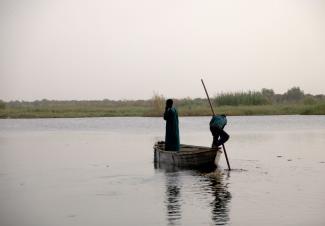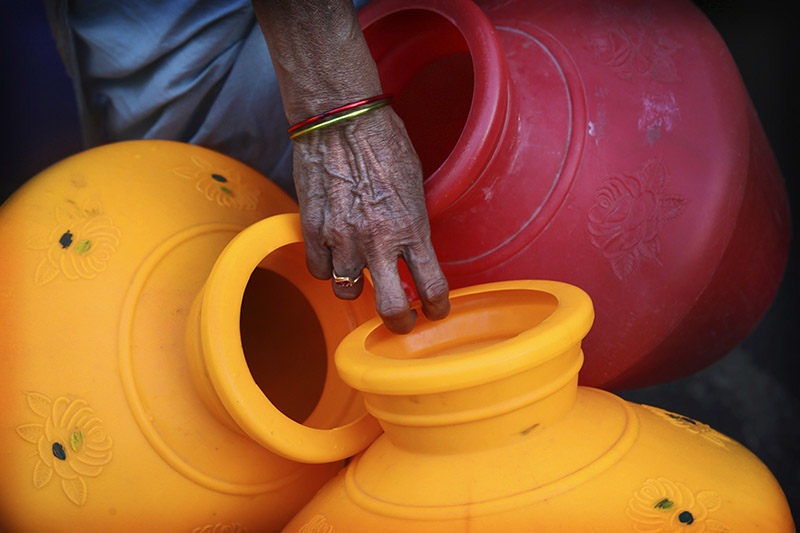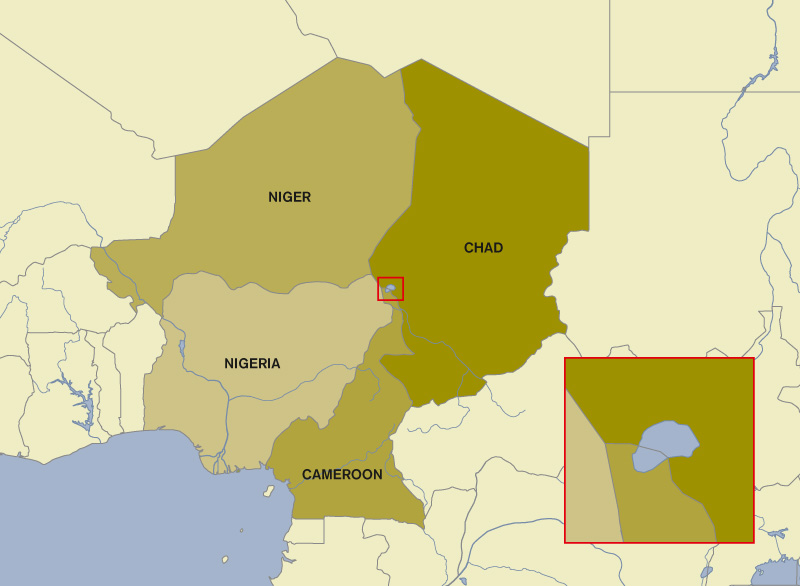Climate change
A vicious circle at Lake Chad

On behalf of the G7, the group of the seven most important industrialised nations in the western world, adelphi is currently conducting a risk analysis in the Lake Chad region. The countries concerned are Cameroon, Chad, Niger and Nigeria. The analysis should help determine the impact of climate change on livelihoods, security risks and the resilience of the people.
A first interim report on the situation is now available. The report shows that climate change exacerbates existing risks and tensions. The authors believe that it may have an enormous negative impact on the stability of states and societies in the future.
According to the report, climate change is not the direct cause of the conflicts in the Lake Chad region, but it is adding to existing tensions. It is also further hampering sustainable development and peace-building processes. As the authors argue, the impacts of climate change on the region and its connection to the political situation have not yet been sufficiently researched.
The adelphi experts aim to change that. The goal is to cooperate with local actors to explore options that would strengthen people’s resilience. Furthermore, recommendations will be made for how foreign-policy makers should best tackle risks of climate-induced fragile statehood. The authors also want to ensure that humanitarian aid and official development assistance (ODA) are applied in an appropriate and effective way in both the short and the long term.
Security risks
The Sahel region on the southern edge of the Sahara desert is marked by poverty, low levels of education and weak socio-economic development. According to the UN Food and Agriculture Organization (FAO), over 7 million people suffered food insecurity in the past year. As a result of decades of political marginalisation, people have lost trust in their governments. Many cannot identify with political institutions.
All of that has allowed armed opposition groups like the Islamist Boko Haram to dominate in the region. It first recruited supporters in Nigeria, then in neighbouring countries. Groups like it are an enormous security threat in the region. They terrorise the people through rapes and systematic executions. In defence, people form militant vigilante groups. Conflicts between the Nigerian state, vigilante groups and opposition groups have exacerbated tensions, according to the report.
The security situation has had a significant impact on the resilience of the people. Terror and the loss of livelihoods have spurred flight and displacement both within countries and across borders, as the authors explain. The flow of refugees has caused new conflicts and intensified competition over resources between displaced people and the local population.
The ongoing conflicts have prevented people from confronting the challenges that arise in the region due to climate change, the report states. The authors explain that climate change has limited the availability of natural resources. Moreover, access to these resources is being controlled by the conflict parties.
Groups like Boko Haram control large territories and have weakened the economy of the region. They destroy harvests and infrastructure like roads, making it impossible for traders to transport their goods. These actions have had disastrous impacts on food security in a region where 80 to 90 % of the people depend on farming, fishing and animal husbandry. The report points out that these industries have also been particularly hard hit by climate change.
Extreme change
Climate change has dramatically transformed the entire area of the Lake Chad Basin. The lake’s water level is becoming ever harder to predict, the weather is volatile, and precipitation is highly variable. The Lake Chad Basin makes up eight percent of the African continent and comprises diverse climate zones, ranging from the desert in the north to humid tropics in the south. The unpredictability of rainfall has presented local people with significant challenges and has had disastrous consequences for food production.
If this vicious circle of climate change and conflict is not broken, the current crisis will worsen, and the entire region will become increasingly unstable. The authors recommend that four aspects must be taken into account when considering future solutions:
- Armed groups are very adaptable. They have proven themselves to be extremely resilient and can develop strategies to respond to change.
- Many self-defence militias have formed as a reaction to armed groups. Their role in future conflicts and with regard to stability remains very unclear. Whether they will be willing to demobilise once the threat of armed opposition groups has diminished, is an open question.
- Urbanisation is increasing, not least due to resettlements. These challenges must be managed well. The challenge is to create sustainable livelihoods for people in cities as well as to help refugees return to their homelands.
- Finally, it is important that humanitarian aid and ODA be both transparent and focused on the long term. The authors emphasise that the causes of the crisis must always be borne in mind.
Link
Nagarajan, C., et al, 2018: Climate-fragility profile: Lake Chad Basin.
https://www.adelphi.de/de/system/files/mediathek/bilder/Lake%20Chad%20Climate-Fragility%20Profile%20-%20adelphi.pdf









